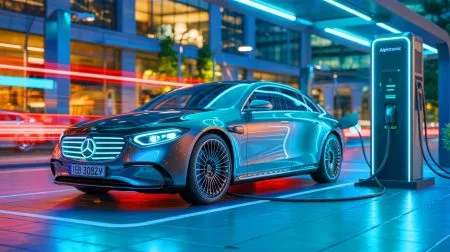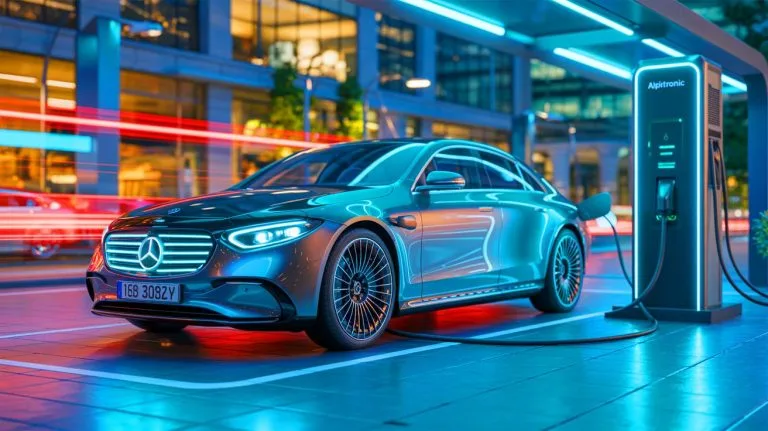| IN A NUTSHELL |
|
In recent years, the electric vehicle (EV) industry has been at the forefront of technological innovation, with companies racing to overcome the challenges of longer charging times compared to traditional refueling. The introduction of megawatt charging technology by Chinese automaker BYD has set a new benchmark, allowing EVs to gain hundreds of miles of range in mere minutes. In response to this breakthrough, Mercedes-Benz has stepped up its efforts to demonstrate that Europe is not lagging behind. The German automaker is preparing to launch advanced charging stations that promise to revolutionize the driving experience for EV users globally.
Partnership with Alpitronic
One of the persistent challenges for electric vehicle adoption is the time spent at charging stations. While refueling a gasoline vehicle typically takes only a few minutes, recharging an EV battery can require significantly longer stops. To address this issue, Mercedes-Benz has announced a partnership with Alpitronic, a specialist in fast-charging technology, to deploy its new HYC 1000 system. This system is slated to roll out next year in both Europe and North America.
The new charging stations will deliver up to 1,000 kilowatts of power, nearly double the speed considered fast today. For instance, a future Mercedes CLA model could recover approximately 200 miles of range in just ten minutes, provided the battery can handle such power. The system’s secret lies in a central cabinet that can supply up to four charging stations. If only one vehicle is connected, it receives the full power available; if multiple vehicles are charging simultaneously, the system dynamically distributes the energy.
This flexibility caters to all vehicle types, offering the same level of service to both high-end models and more affordable vehicles. For drivers, this innovation theoretically leads to less waiting on highways, smoother long-distance travel, and a recharging experience that closely mimics the simplicity of traditional refueling.
Global Expansion with Europe in Focus
Mercedes-Benz is not stopping at technological innovation alone. With Alpitronic, the brand is already working on a true megawatt charger capable of delivering a full 1,000 kW to a single vehicle. A prototype has already demonstrated its feasibility by powering the Mercedes-AMG GT XX concept in a record-setting test.
Beyond technology, Mercedes-Benz is focused on expanding its charging network, which is already present in Germany, Austria, China, Japan, and the United States. The next phase of expansion will target eight additional countries, including France, Italy, and Spain. The company’s ambitious goal is to surpass 10,000 fast-charging points by 2030. Additionally, the European consortium Ionity, in which Mercedes holds a stake, has also confirmed the installation of the HYC 1000 system in its stations.
Following BYD’s significant achievement in March, Mercedes-Benz aims to prove that Europe can compete in the ultra-fast charging arena. By partnering with Alpitronic, the German automaker plans to deploy its HYC 1000 system by 2025, capable of delivering up to 1,000 kW. The objective is clear: drastically reduce waiting times, expand the network across Europe, and reach 10,000 fast-charging points by the end of the decade.
Implications for the Electric Vehicle Market
The advancements in charging technologies have significant implications for the electric vehicle market. Faster charging times can potentially eliminate a major barrier to EV adoption, making these vehicles more appealing to a broader consumer base. As charging infrastructure becomes more widespread and efficient, range anxiety—one of the main concerns for potential EV buyers—could diminish substantially.
The collaboration between Mercedes-Benz and Alpitronic represents a strategic move to position Europe as a leader in the global EV market. By investing in cutting-edge technology and infrastructure, Mercedes-Benz not only enhances its competitive edge but also contributes to the broader goal of reducing reliance on fossil fuels. The success of such initiatives could accelerate the transition to more sustainable transportation solutions worldwide.
Moreover, these developments could pressure other automakers to invest in similar technologies to remain competitive. The ripple effect could hasten the pace of innovation and infrastructure development across the industry, benefiting consumers and the environment alike.
Supercar maintenance: Tips for keeping your ride in top shape
Challenges and Future Prospects
Despite the promising advancements in charging technology, several challenges remain. The integration of high-power charging stations into existing infrastructure requires significant investment and careful planning. Grid capacity and stability are also concerns, as the demand for electricity could surge with the proliferation of fast-charging stations.
Additionally, the compatibility of different vehicles with high-power charging systems poses a technical challenge. Not all existing EVs are equipped to handle the power levels offered by the new HYC 1000 system, which could limit its initial impact. As the technology evolves, automakers and infrastructure providers will need to collaborate closely to ensure seamless integration and compatibility across different platforms.
Looking ahead, the success of Mercedes-Benz’s initiative could hinge on its ability to scale up its network and maintain high service levels. As the race for faster, more efficient charging continues, the industry must address these challenges to unlock the full potential of electric mobility. How will automakers and infrastructure providers navigate these challenges to shape the future of transportation?
Did you like it? 4.4/5 (28)






Wow, this sounds amazing! How soon can we expect these chargers in the US? 🚗🔋
Wow, this is incredible news for EV owners! 🚗⚡ Can’t wait to see this tech in action!